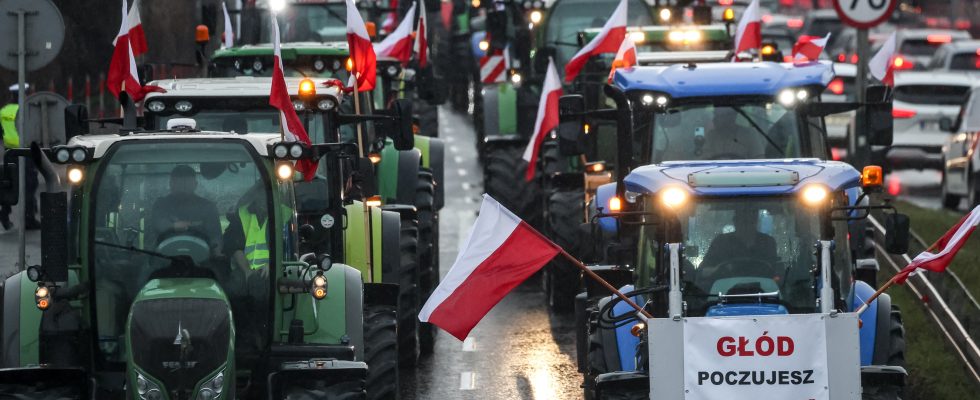While Europe is burning, Brussels is throwing buckets of water. And multiplies the pledges without convincing: ecological obligations, Ukrainian imports, legislation about to be voted on biodiversity and polluting emissions… The ministers of the Twenty-Seven get to work. They will meet this Monday, February 26 in Brussels to examine new regulatory “simplification” proposals from the European Commission. At the same time, farmers are intensifying their pressure.
In Paris, the Agricultural Show is the ideal place for farmers to express their anger towards leaders… And therefore Emmanuel Macron, who is traveling there this Saturday. The organizers also decided to delay the opening of the Salon to the public after the outbreak of hundreds of demonstrators during the head of state’s meeting with union officials, which led to clashes and the exceptional deployment of CRS in the aisles.
But Paris is not the only capital to be shaken. In several European countries, including Belgium and Brussels where tractor parades are expected, the actions follow one another and are similar. On Wednesday February 21, it was the Spanish tractors which converged towards the center of Madrid. They all denounce the same thing: competition deemed unfair from certain countries outside the EU. On the banners, we demand “fair prices” for farmers. Their wish? Being able to “pass production costs on to the final price of their products so as not to sell at a loss”. Farmers are also demanding better “import control” in Spain, explained Luis Cortés, national coordinator of Union de Uniones, on public television channel RTVE.
Tractors sweep through European capitals
Same story in the Czech Republic where several thousand farmers joined the European protest movement on Thursday February 22. Same method as their neighbors: their agricultural machines go to the centers of several cities. Similar situation in Greece. More than 130 tractors from all over the country parked on Tuesday February 20 in front of the Parliament in Athens where 8,000 farmers, according to the police, chanted their discontent.
“Without agricultural production, there is no future in Greece”, could be read on a huge banner, while signs on tractors proclaimed in particular “we suck the blood of farmers”. Their frustration is partly fueled by the slow pace of compensation after the devastating fires and floods of 2023 in Thessaly, the country’s great agricultural plain.
The unease is also spreading in eastern Europe, such as in Poland, where farmers announced, Friday February 23, a blockade for 24 hours starting this Sunday of an important border crossing with Germany. The object of their ire: the arrival of Ukrainian grain in Poland. Concretely, the EU had set up solidarity corridors to allow Ukrainian agricultural production to flow onto world markets.
A late reaction in Brussels
Poland agreed to extend a helping hand, but the situation became complicated: while Ukrainian goods were only supposed to transit through their country, they largely stayed put, causing a buildup of goods and a decline prices. The Polish press relays two embarrassing incidents for the government: on February 20, a cargo of grain spilled on the asphalt and a banner calling on Vladimir Putin to “bring order to Ukraine and Brussels.”
Poland, Czech Republic, Spain… Four months before the European elections, the anger of the countryside could weigh on the vote. Brussels listens to operators and works behind the scenes. Too late ? Certainly, as early as September, the President of the Commission, Ursula von der Leyen, had bowed her back in the face of growing resistance to environmental regulations. But demonstrations and blockages had to accumulate for Brussels to belatedly launch, at the end of January, the promised “strategic dialogue” with the agri-food industry. Candidate for a second term and keen to spare conservative elected officials, Ursula von der Leyen announced in person at the beginning of February the withdrawal of a controversial text reducing the use of pesticides.
A vast “simplification” project
Above all, Brussels hastily proposed at the end of January a temporary and partial exemption from fallow obligations and reinforced supervision of Ukrainian imports, exempt from customs duties and accused of lowering prices. Under pressure at national level, the Twenty-Seven demanded from Brussels a vast project to “simplify” the rules of the Common Agricultural Policy (CAP).
The Commission presented its first ideas on Thursday February 22: relaxation of requirements on meadows, reduction of inspection visits, tolerance in the event of a climatic episode preventing compliance with the criteria… “The discussion on Monday will focus on these applicable short-term measures very quickly”, even before opening – longer – legislative reviews of the CAP that many States are demanding, underlines a European diplomat to AFP.
It remains to be seen whether this road map will be enough to calm the anger of the peasant world or if we are still putting a plaster on an open wound. One thing is certain: the tractor revolution is far from over.
